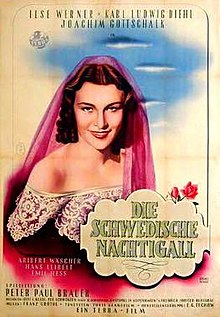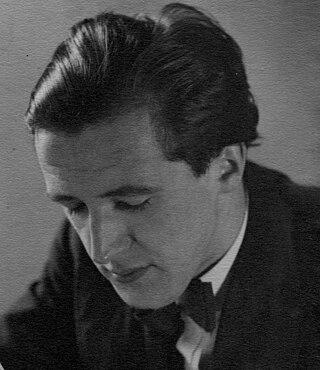
Sebastian Peschko was a German classical pianist, specialized in the art form of lieder. He was accompanist to some of the foremost lyrical singers of the 20th century.
Bayerischer Poetentaler is a Bavarian literary prize of the writers guild Münchner Turmschreiber.

The Berliner Kunstpreis, officially Großer Berliner Kunstpreis, is a prize for the arts by the City of Berlin. It was first awarded in 1948 in several fields of art. Since 1971, it has been awarded by the Academy of Arts on behalf of the Senate of Berlin. Annually one of its six sections, fine arts, architecture, music, literature, performing arts and film and media arts, gives the great prize, endowed with €15,000, whereas the other five sections annually award prizes endowed with €5,000.
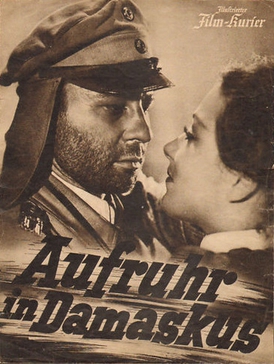
Uproar in Damascus is a 1939 German thriller film directed by Gustav Ucicky and starring Brigitte Horney, Joachim Gottschalk and Hans Nielsen. It is set during the First World War with German troops battling the Arab Revolt led by Lawrence of Arabia and the British. The film was officially honored as "artistically valuable" and having "special political value".

The Girl at the Reception is a 1940 German drama film directed by Gerhard Lamprecht and starring Magda Schneider, Heinz Engelmann, and Carsta Löck.

The Heart of St. Pauli is a 1957 West German musical film directed by Eugen York and starring Hans Albers, Hansjörg Felmy and Jürgen Wilke. The film is set in the St. Pauli district of Hamburg and was an attempt to capitalise on the success of Albers’ earlier starring role in Große Freiheit Nr. 7. It was made by the Hamburg-based studio Real Film and shot at the Wandsbek Studios and on location in the city. The film's sets were designed by the art directors Mathias Matthies and Ellen Schmidt.

Triad is a 1938 German drama film directed by Hans Hinrich and starring Lil Dagover, Paul Hartmann and Rolf Moebius.
Whom the Gods Love is a 1942 Austrian historical musical film directed by Karl Hartl and starring Hans Holt, Irene von Meyendorff, and Winnie Markus. The film is a biopic of the Austrian composer Wolfgang Amadeus Mozart. It was made as a co-production between the giant German studio UFA and Wien-Film which had been set up following the German annexation of Austria. The film was part of a wider attempt by the Nazis to portray Mozart as an authentic German hero. Like many German biopics of the war years, it portrays the composer as a pioneering visionary.
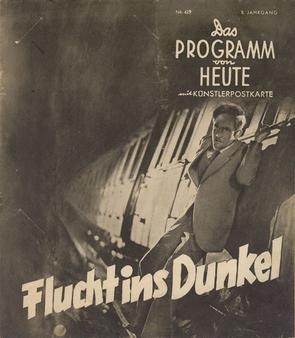
Escape in the Dark or Flight into Darkness is a 1939 German crime film directed by Arthur Maria Rabenalt and starring Hertha Feiler, Joachim Gottschalk and Ernst von Klipstein.

The Appeal to Conscience is a 1949 German mystery film directed by Karl Anton and starring Karl Ludwig Diehl, Werner Hinz and Gustav Diessl. It was originally shot in 1944, but remained uncompleted until it was finished by DEFA in the post-war era. It remained unreleased until it was given a 1949 premiere in Austria. Subsequently it was distributed in East Germany in 1950 and West Germany in 1951.

Men Are That Way is a 1939 German drama film directed by Arthur Maria Rabenalt and starring Hertha Feiler, Hans Söhnker and Hans Olden. The film's sets were designed by the art director Willi Herrmann. It was remade by Rabenalt in Austria as Arena of Fear (1959).
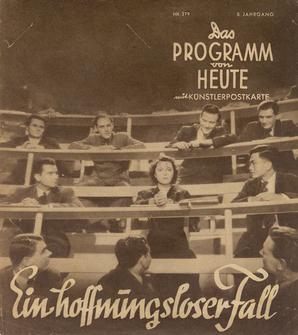
A Hopeless Case is a 1939 German comedy film directed by Erich Engel and starring Jenny Jugo, Karl Ludwig Diehl and Hannes Stelzer.
